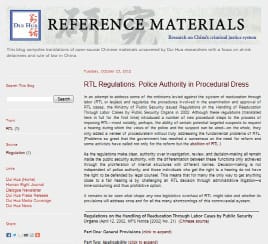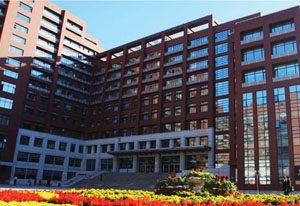Reference Materials Go Online
Dui Hua launched a new blog featuring translations of Chinese research findings in October. The Reference Materials blog shares the name of the now retired print publication that was offered to diplomats, scholars, and human rights activists from 2009 through September 2012. The electronic version offers a searchable format that is open to the public. Every month, Dui Hua will post English translations of Chinese open source documents related to prisoner cases, criminal justice statistics, and regulations.

Reference Materials archives are not available online but are available for purchase. For more information, please send us an email.
East Coast Engagement
In late September, Kamm went to the East Coast for meetings in New York and Washington DC. In both cities, senior Chinese diplomats met with Kamm to have candid discussions about the heated standoff in the East China Sea and the tough positions on China held by US presidential candidates. Kamm also met with executives of New York-based hedge funds to talk about the current state of US-China relations and the uncertainties surrounding China’s upcoming National People’s Congress slated for March 2013.
In Washington DC, Dui Hua Director Linda Ziglar hosted the annual Friends of Dui Hua DC Reception. Around 30 close friends and supporters came out to hear about recent human rights developments and the impending leadership transition in China. Kamm updated guests about Dui Hua’s recent successes and upcoming programs in the areas of juvenile justice and women in prison. Kamm also met with members and staff of the Congressional Executive Commission on China and the US-China Economic and Security Review Commission as well as officials of the US Department of State and the US National Security Council.
Juvenile Justice on the Air

During his trip to Hong Kong in August, Kamm joined RTHK radio host Gavin Grey on Morning Brew to talk about juvenile delinquency in China and the US, and relevant areas for improvement and exchange. Kamm emphasized the importance of Dui Hua’s Juvenile Justice Expert Exchange with China’s Supreme People’s Court. China currently incarcerates over 60 percent of its juvenile offenders and is working to implement new juvenile procedures that will introduce more diversionary and rehabilitative services as alternatives to incarceration. (Photo credit: Radio 3)
Organizing for Women in Prison
While in Beijing in August, Kamm met with Renmin University Law School’s Center for Criminal Procedure and Reform to discuss possible cooperation on an international conference on the Bangkok Rules. Known formally as the United Nations Rules for the Treatment of Women Prisoners and Non-Custodial Measures for Women Offenders, the rules have yet to gain the attention of prison authorities worldwide, despite their focus on the world’s fastest growing prisoner demographic—women.

A possible venue for the conference is Hong Kong, and discussions are underway to confirm a local partner. With women accounting for nearly 20 percent of its prisoners (only about seven percent of US prisoners and six percent of Chinese prisoners are women), Hong Kong has one of the highest percentages of women prisoners in the world. Many women incarcerated in Hong Kong are from mainland China.
Helping bring attention to the needs of incarcerated women and foster international partnerships, Kamm was quoted extensively by The New York Times in a September article entitled, “Women in Prison Fare Better in China.” During the same month, Kamm met with Andrea Huber of Penal Reform International regarding a possible international conference on the Bangkok Rules.
